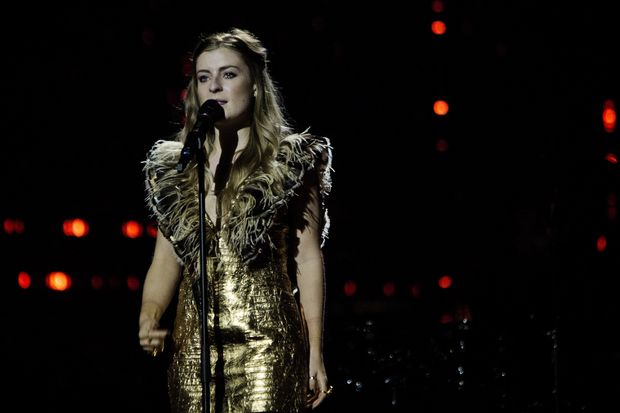Seven million of us will be tuning in at 8pm tomorrow night for the Eurovision final, rising to nine million when the UK number is played. But what do we expect to see, and do we think it’s rigged? The Spectator’s Culture House Daily blog, in conjunction with YouGov, is able to give you an exclusive poll of 1,860 Brits, seeing what the nation thinks about world’s most-watched cultural event.
Seventeen years of hurt has led Britain to think that we just can’t win this thing anymore. A pitiful 1 per cent of those polled think Molly’s Children of the Universe will take the crown tomorrow night, a low figure given that the bookies have her at 8-1. Just over half of us think she’ll finish bottom of the table. I’d place myself amongst the 8 per cent who expect her in the top ten: word is that she’s brushed up her stage performance.
Next comes the biggest reason that Brits think we’ll bomb: only a quarter of us have heard her song. Many countries’ Eurovision entry has hit the top of the native charts – the Swedish and Dutch entries got to no1, Denmark to no2. But Molly peaked at no.48 in the UK charts – as you’d expect, given that there was zero public consultation in choosing the song. The Swedish entry from Sanna Neilson (below) has had eight million listens on Spotify – Molly has had just 128,000.
The most successful Eurovision numbers tend to be picked by an open vote, in contests with mass popularity like Sweden’s Melodifestivalen. In Britain, an anonymous BBC bureaucrat nominates our candidate, similar to the procedure used in the old Soviet InterVision Song Contest. Molly is our best entry for many years, but she did not have the advantage of being selected in an open contest – tomorrow will be the first time she has ever sought a vote. Compare that to the favourite, Sweden’s Sanna, who made six attempts at winning the nomination via a television jury before she was selected.
picked by an open vote, in contests with mass popularity like Sweden’s Melodifestivalen. In Britain, an anonymous BBC bureaucrat nominates our candidate, similar to the procedure used in the old Soviet InterVision Song Contest. Molly is our best entry for many years, but she did not have the advantage of being selected in an open contest – tomorrow will be the first time she has ever sought a vote. Compare that to the favourite, Sweden’s Sanna, who made six attempts at winning the nomination via a television jury before she was selected.
[datawrapper chart=”http://static.spectator.co.uk/s8eV8/index.html”]
I argued in The Spectator last year that the BBC should hold an open contest to find our entrant, rather than lazily ask one of its bureaucrats pick an entrant and have Radio 2 plays it. Strikingly, Brits think by a margin of six-to-one that it’s time that the BBC let the public choose (which they once did). Here’s the poll.
[datawrapper chart=”http://static.spectator.co.uk/VPveX/index.html”]
And the same proportion think that if the BBC did open the contest, we’d have a better chance of winning. (Something the Nordic nations have known for years). Molly is up against a bunch of thoroughbreds, groomed for this one particular race. And she’s never had a practise run – not even a chance to compete in the semi finals (the BBC pay so much to Eurovision that the UK entry is guaranteed a place in the final, no matter how dire).
[datawrapper chart=”http://static.spectator.co.uk/5hxpq/index.html”]
Eurovision is that it’s more than just a song contest. It’s a collision of politics, culture, zeitgeist, enmity and fraternity. YouGov asked:
‘Some people think that countries voting politically means it is now impossible for certain countries to win the Eurovision song contest. Other people think countries lose because their entries to the competition just haven’t been good enough. Which of the following best represents your view?’
Brits are wise to the game:
[datawrapper chart=”http://static.spectator.co.uk/YPrzJ/index.html”]
And now, on to the sad case of the Tolmachevy twins, who are representing Russia at time when Putin is munching Ukraine. This pair of butter-wouldn’t-melt twins deliver a lyric that is a bit too close to home:
‘Living on the edge / closer to the crime / cross the line a step at a time’.
Or send in unbadged troops / destablise the region / then call for autonomy. Anyway, the sisters were booed in Tuesday night’s semis in Copenhagen – so YouGov asked if they’re facing unfair discrimination.
‘More specifically, do you think the recent situation in Ukraine will impact on how well Russia does at the Eurovision song contest?’
Of course, many of us watch Eurovision for the grudge matches. And how many points do we expect Ukraine to give Russia?
[datawrapper chart=”http://static.spectator.co.uk/QPb45/index.html”]
This, I fear, is a bit simplistic. Ukraine is split between Slavophile and Europhile – Crimea, for example, is mostly Russian-speaking and is still covered by Ukrainian telecom networks, so its votes will count as Ukrainian. One of the many layers of complexity we’ll see tomorrow night.







Comments